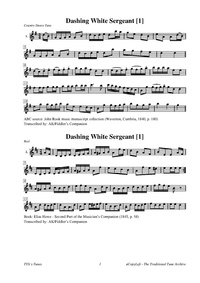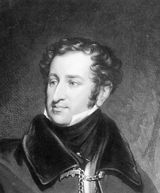Template:Pagina principale/Vetrina: Difference between revisions
No edit summary |
No edit summary |
||
| Line 1: | Line 1: | ||
{{SheetMusic | {{SheetMusic | ||
|f_track= | |f_track=Dashing White Sergeant.mp3 | ||
|f_pdf= | |f_pdf=Dashing White Sergeant.pdf | ||
|f_artwork= | |f_artwork=Bishop.jpg | ||
|f_tune_name= | |f_tune_name=Dashing White Sergeant | ||
|f_track_title=Morpeth_Rant_(1) | |f_track_title=Morpeth_Rant_(1) | ||
|f_section=X5 | |f_section=X5 | ||
|f_played_by=[https://soundcloud.com/ | |f_played_by=[https://soundcloud.com/corra-music Corra Music] | ||
|f_notes= | |f_notes= Sir Henry Rowley Bishop. | ||
|f_caption=The | |f_caption=The words to the song are sometimes attributed to General John "Gentleman Johnny" Burgoyne (1722–1792), who surrendered a British army at Saratoga during the American Revolution. | ||
|f_source=[https://soundcloud.com/ | |f_source=[https://soundcloud.com/corra-music/dashing-white-sergeant-just-added Soundcloud] | ||
|f_pix=420 | |f_pix=420 | ||
|f_picpix=200 | |f_picpix=200 | ||
|f_article=[[ | |f_article=[[Dashing_White_Sergeant_(1)_(The) | '''Dashing White Sergeant''']] | ||
is the name of a specific social (ceilidh) dance in Scotland, a reel-time circle dance. J. Scott Skinner, who in his younger days (before earning fame as a violinist and composer) was a country dancing master, taught a progressive longways country dance by that name, one of the few in his mostly North-East (Scottish) repertoire. | |||
Tunes associated with the dance are the namesake tune, along with "[[My Love is but a Lassie Yet (1)]]" and "[[Rose Tree (The)]]," although, as Christine Martin (2002) points out, any reel or polka will do. Alternate 32-bar tunes are sandwiched in between "The Dashing White Sergeant" played at the beginning and end. | |||
The tune of "The Dashing White Sergeant" is derived from a song of the same name, written by an English musical composer, conductor and arranger Sir Henry Rowley Bishop [https://en.wikipedia.org/wiki/Henry_Bishop_(composer)] (1786–1855) and published in the mid-1820's. | |||
Apparently the song was to be part of one of Bishop's operas, although there is no evidence it ever actually made it into one. Rowley Bishop, who had a long run with various works in the London theaters and was the first musician to be knighted, is perhaps nowadays more famous for his composition "[[Home Sweet Home]]." | |||
In his lifetime he composed some 120 dramatic works, including 80 operas, light operas, cantatas, and ballets. He is also remembered for his appointment to the Reid Professorship of Music at Edinburgh University, a post he assumed but which he declined to give any lectures in support of--as consequence of which he was invited to resign two years later [David Murray, '''Music of the Scottish Regiments''', Edinburgh, 1994, p. 210]. | |||
}} | }} | ||
Revision as of 16:32, 8 September 2023

Played by: Corra Music
Source: Soundcloud
Image: Sir Henry Rowley Bishop.

is the name of a specific social (ceilidh) dance in Scotland, a reel-time circle dance. J. Scott Skinner, who in his younger days (before earning fame as a violinist and composer) was a country dancing master, taught a progressive longways country dance by that name, one of the few in his mostly North-East (Scottish) repertoire.
Tunes associated with the dance are the namesake tune, along with "My Love is but a Lassie Yet (1)" and "Rose Tree (The)," although, as Christine Martin (2002) points out, any reel or polka will do. Alternate 32-bar tunes are sandwiched in between "The Dashing White Sergeant" played at the beginning and end.
The tune of "The Dashing White Sergeant" is derived from a song of the same name, written by an English musical composer, conductor and arranger Sir Henry Rowley Bishop [1] (1786–1855) and published in the mid-1820's.
Apparently the song was to be part of one of Bishop's operas, although there is no evidence it ever actually made it into one. Rowley Bishop, who had a long run with various works in the London theaters and was the first musician to be knighted, is perhaps nowadays more famous for his composition "Home Sweet Home."
In his lifetime he composed some 120 dramatic works, including 80 operas, light operas, cantatas, and ballets. He is also remembered for his appointment to the Reid Professorship of Music at Edinburgh University, a post he assumed but which he declined to give any lectures in support of--as consequence of which he was invited to resign two years later [David Murray, Music of the Scottish Regiments, Edinburgh, 1994, p. 210].
...more at: Dashing White Sergeant - full Score(s) and Annotations
X:5 T:Morpeth Rant [1] S:Petrie's Second Collection of Strathspey Reels and Country Dances &c. Z:Steve Wyrick <sjwyrick'at'astound'dot'net>, 6/11/04 N:Petrie's Second Collection, page 17 L:1/8 M:C R:Reel K:G V:1 clef=treble name="5." [V:1](D/E/F)|G2DC B,G,B,D|ECEG FDFA|BGcA dBAG|FGAB A2 GF| G2DC B,G,B,D|ECEG FDFA|Bedc BAGF|[B,2D2G2][B,2D2G2][B,2D2G2]::ef| gdBG FAce|dBAG {G}F2 (ED)|cAcA BGBG|FGAF D2 (D=F)| ECEG cBAG|FDFA dcBA|Bgfe dcBA|[B,2D2G2][B,2D2G2][B,2D2G2]:|]
